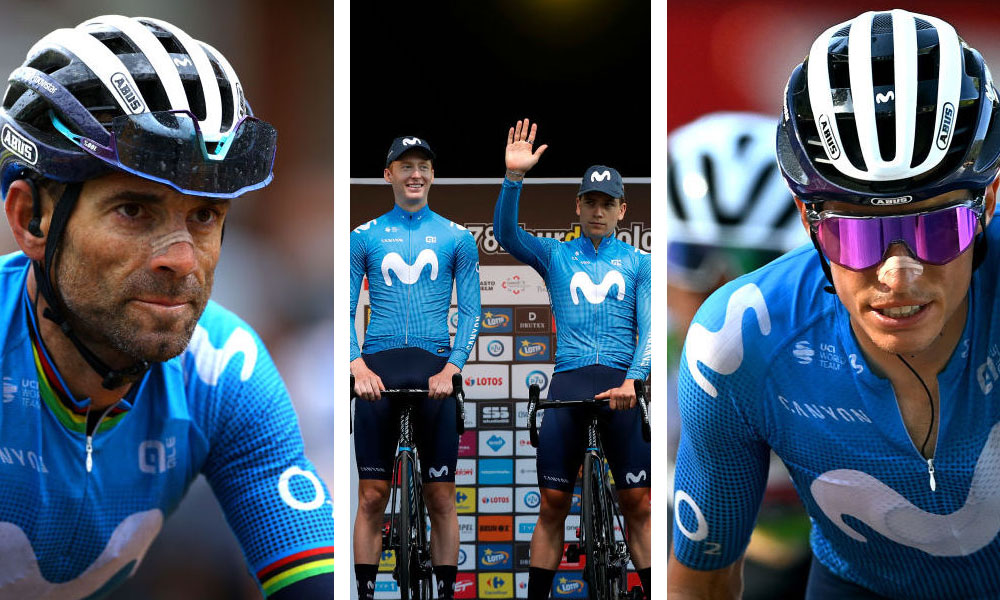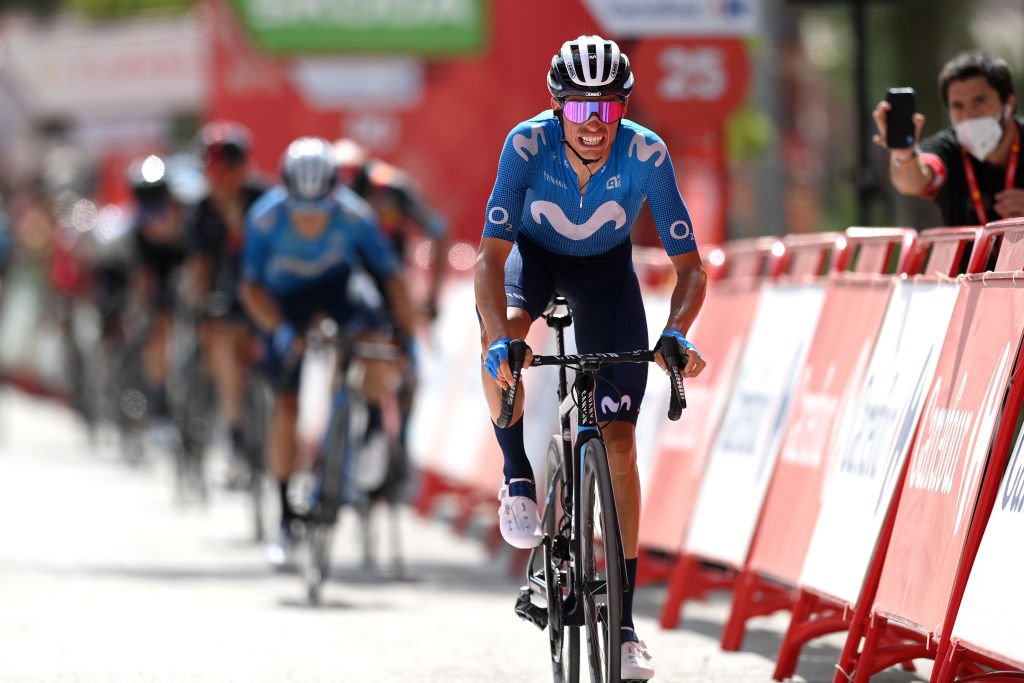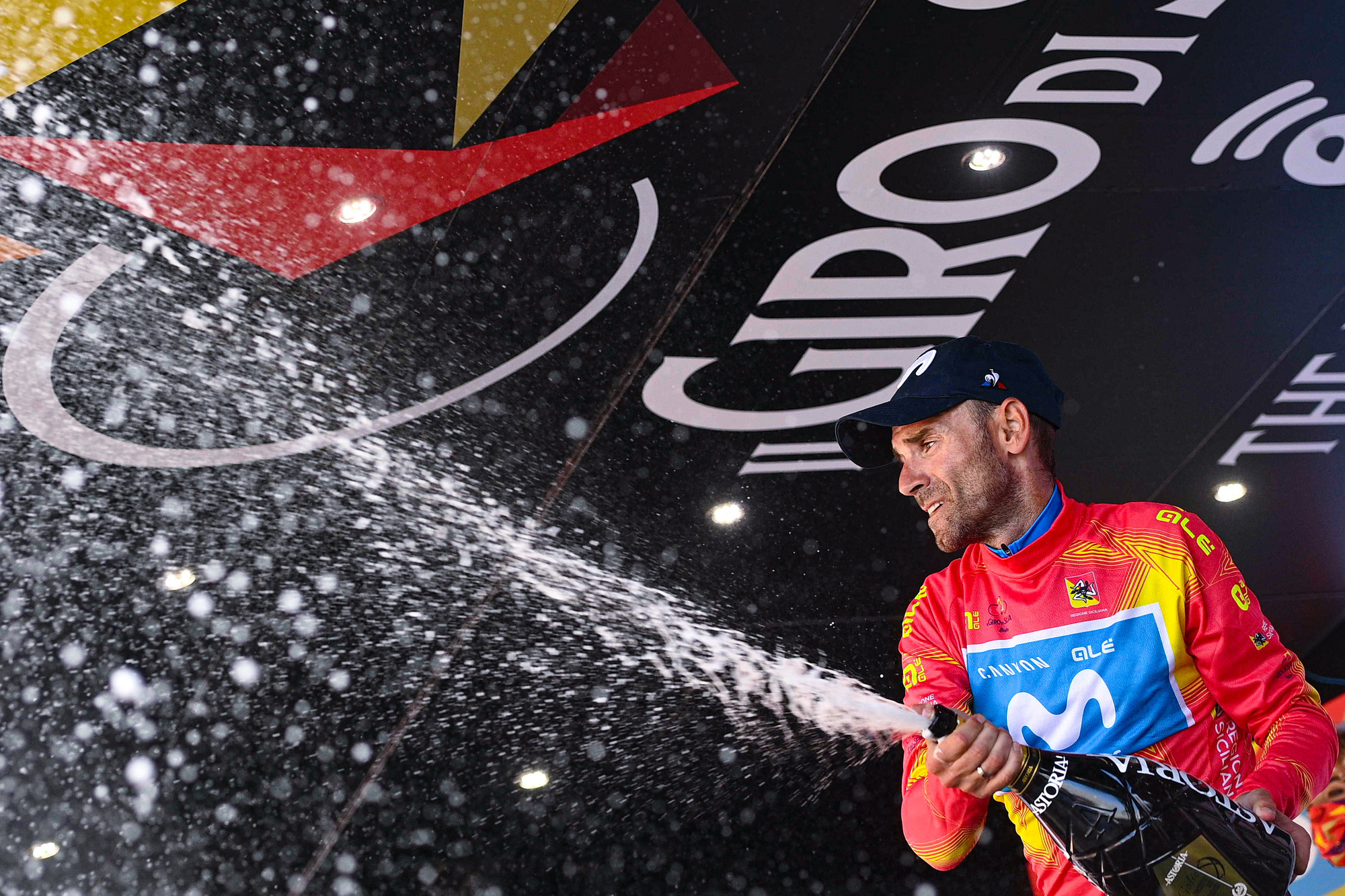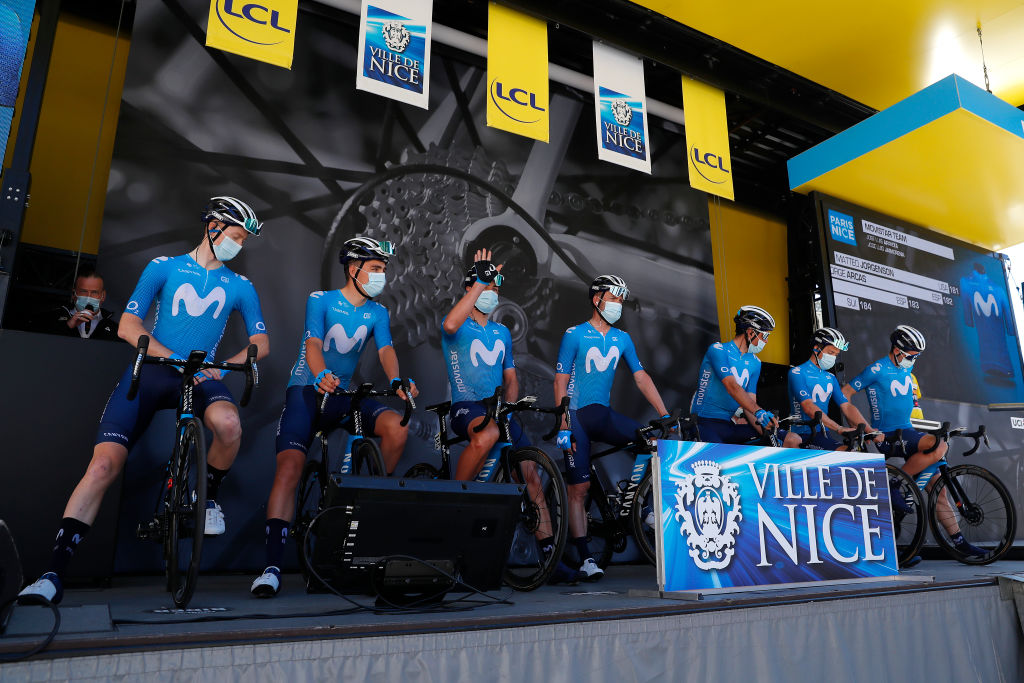2022 team preview: Movistar men
Enric Mas sole Grand Tour leader while Alejandro Valverde rides farewell tour

Who?
- Manager: Eusebio Unzué
- Squad size: 29
- Average age: 27.2
The longest-running team in the WorldTour peloton, Eusebio Unzué's Spanish squad dates back to 1980, racing as Reynolds, Banesto, ibanesto.com, Illes Balears, and Caisse d'Epargne, before telecom giant Movistar took over title sponsorship in 2011.
The team won five consecutive editions of the Tour de France through Miguel Indurain in the 1990s, while the likes of Nairo Quintana and Richard Carapaz have brought in three-week titles in more recent years. However, the past couple of years have been testing, and the wheels have been set in motion on a major restructuring process at rider and management level.
The changing of the guard will be signified when Alejandro Valverde, the team's leading light for 15 years and winner of more than 100 races for Movistar, hangs up his wheels at the end of 2022.
How did they fare in 2021?
- Wins: 15
- UCI world ranking: 11th – 6656 points
Having endured arguably the poorest campaign of their history in 2020, they bounced back a little but it will hardly be remembered as a vintage year. In fact, for most, the abiding memory of Movistar in 2021 will be the shambolic episode at the Vuelta a España, where Miguel Ángel López suddenly climbed off his bike and stormed out of the Vuelta a España on the penultimate day.
Despite initially limiting the controversy by keeping a lid on the details and negotiating a relatively quiet termination of López’s contract, the episode continues to haunt Movistar as López has launched a volley of attacks in the media.
He firstly called out the Movistar management for pulling him out of the Tour de France and not letting him ride the Olympic Games, and just this week slammed Enric Mas as an ‘egotist’, while confirming he was ordered to stop riding in the chase when the GC group split on that fateful day at the Vuelta.
López has become the big blot on their copy paper but he was actually responsible for their best moment of the year, winning the queen stage of the Vuelta atop the Gamoniteiru just 48 hours before his walk-out. Had things turned out differently, they’d have had two riders on the final podium in Santiago de Compostela.
The latest race content, interviews, features, reviews and expert buying guides, direct to your inbox!
Even so, Mas’ runner-up finish was a strong result. He wasn’t able to challenge Primož Roglič (Jumbo-Visma) but he was the best of the rest in a field that included the Ineos Grenadiers duo of Egan Bernal and Adam Yates, plus Bahrain Victorious’ strong pairing of Jack Haig and Gino Mader. That result came a couple of months after finishing sixth at the Tour de France, where he was not a part of the podium fight but solid nonetheless.
Elsewhere, victories were hard to come by, with Abner González’s brace at the Cuban nationals putting a gloss on the tally of 15. After a barren 2020, Valverde returned to winning ways but three is some way short of the output he produced for so long. There was little compensation and the fact that new signing Ivan García Cortina failed to strike will have been a source of disappointment.
In for 2022: Gorka Izaguirre (Astana), Oier Lazkano (Caja Rural-Seguros RGA), Oscar Rodriguez (Astana), Max Kanter (Team DSM), Ivan Sosa (Ineos Grenadiers), Will Barta (EF Education-Nippo), Vinicius Rangel (neo-pro), Alex Aranburu (Astana)
Out for 2022: Miguel Ángel López (Astana), Marc Soler (UAE Team Emirates), Hector Carretero (Kern Pharma), Davide Villella (Cofidis), Dario Cataldo (Trek-Segafredo), Juan Diego Alba (Androni), Gabriel Cullaigh, Sebastian Mora
Key riders

Enric Mas: The Spaniard remains a couple of levels below the likes of Roglič and Tadej Pogačar (UAE Team Emirates) but he has cemented himself as a proven and consistent Grand Tour rider. His sixth and third at the Tour and Vuelta, respectively, followed on from his brace of fifth places at the same races in 2020.
That was his first season on the team, having been identified as a replacement for the likes of Mikel Landa, Richard Carapaz, and Nairo Quintana. He has perhaps not quite hit the heights expected in the wake of his breakthrough runner-up finish at the 2018 Vuelta, notably not winning a Grand Tour stage since then. However, his consistency and all-round solidity are signs of a solid foundation that could allow him to try and make that next step. He is, after all, still only 26.
Alejandro Valverde: The lifeblood of the team for so long is hanging around for one final hurrah. Valverde’s retirement has been a fluctuating affair for a few years now but the date has now been definitely set for the end of next year, when he’ll be 42.
The Spaniard has won more than 100 races during his 16-year spell at the team and doesn’t owe them anything, but it wouldn’t be a surprise if he goes out with a bang. In fact, he wouldn’t have carried on if he didn’t sense it was possible.
With wins at the Dauphiné, GP indurain, and Giro di Sicilia this year, plus an Ardennes campaign of fifth at Amstel, third at La Flèche Wallonne, and fourth at Liège-Bastogne-Liège, he waved away the doubts of his barren 2020. Expect him to go big for the Ardennes and the Giro, before skipping the Tour and heading to the Vuelta, where he might just call it a day in Madrid.

Ivan Sosa: Movistar have made a few new signings for 2022 and Sosa is the biggest. Ineos Grenadiers went to huge efforts to grab the Colombian back in 2018 when he’d already agreed terms with Trek-Segafredo. Since then, he has shone in patches but has never really shown consistency or sustained growth. Crucially, he has not really slotted in to domestique role that was expected, especially with compatriot Egan Bernal around.
He did the Giro in 2019, the truncated Vuelta in 2020, and then no Grand Tour this year, even after making such a great start by winning the Tour de la Provence. It shouldn’t be forgotten that Sosa is still just 23. His climbing talent is clear, and if Movistar can harness it well, they have plenty of cause for optimism.
Ivan García Cortina: The Spaniard was presented as a major signing last winter but fell largely flat in his debut campaign. He remains a talented rider who can win sprints from smaller groups, as well having plenty of untapped Classics potential.
Others to watch: Twenty-two-year-old American Matteo Jorgenson had an eye-catching year and his progress is worth keeping track of, while Alex Aranburu adds punch and potential for wins. Vuelta a Burgos best young rider Einer Rubio, 23, of Colombia will be back as well.
Strengths

In Mas, Movistar have a dependable Grand Tour leader who still has room for improvement. What’s more, he’s now their only Grand Tour leader, with both López and Soler heading out the door. While that may in itself constitute a weakness (more on that next), it does at least provide some clarity that may have been lacking in recent years.
Furthermore, Valverde has shown he is not a million miles away from the level that made him so successful for so many years. Even if it’s a subdued campaign, the veteran making his final bow in all the races he’s won in the past will generate enough publicity in itself to paper over any gaps in results.
Finally, the team have been aiming for rejuvenation in recent years and now 11 riders are aged 25 or under. It might not provide instant success in 2021 but does at least give them a platform for the future.
Weaknesses
Two six-episode series of the team’s Netflix documentary had already highlighted communication and team harmony as their most debilitating - if entertaining - weaknesses, and 2021 only underlined that.
The López incident was utterly shambolic and has even managed to dwarf the tensions that existed between Quintana and Landa, between Quintana and Valverde, and between Soler and just about everyone. Different riders, same problem - it’s hard to dismiss López when he suggests the fault lies with the management.
That might not be such a pressing issue in 2022, given Movistar are losing two key riders in López and Soler. However, while leadership tensions may die down, those two losses certainly constitute a weakness, especially when there are no direct replacements. Mas will lead the line in the Grand Tours but he can’t do all three, and, even if Soler did only record one top-10 finish, there is no one else ready to take the mantle at the Giro, which is likely to be the one left over.
Verdict
Movistar are a team still in the midst of a culture change. When Nairo Quintana was winning Grand Tours and Alejandro Valverde was consistently hitting double figures, it must have seemed that the future was endless, but in the past couple of years the management have realised that the glory days wouldn’t last forever.
Their downfall was precipitated by a disastrous 2019-20 transfer window that saw them lose Carapaz, Quintana, Landa, and Amador - as well as a bust-up with the world’s leading rider agent Giuseppe Acquadro. Despite steadying the ship to a certain extent this year, there is an acceptance that the re-build is a long-term process.
They have tried to inject more nationalities and more young blood, while there has also been a major revamp at management level. Gone is Jose Luis Arrieta, shown the door after nearly a quarter of a century of service and not happy about it, while Leonardo Piepoli get more of a prominent role, along with José Ibarguren, the doctor at Saunier-Duval at the time he tested positive for EPO in 2008. Astana’s aerodynamics specialist Iván Velasco is another new face as team boss Eusebio Unzué seems to have placed power in the hands of Patxi Vila, the head of performance since 2020.
In short, expect another transitional year for ‘The Blues’. Mas should give them a high Grand Tour result, there should be some final flourishes for Valverde, and there’s potential for input from a few other exciting riders, even if they can’t be considered bankers. Movistar won’t be down in the dumps like in 2020, but the glory days won’t return that quickly either.
Patrick is a freelance sports writer and editor. He’s an NCTJ-accredited journalist with a bachelor’s degree in modern languages (French and Spanish). Patrick worked full-time at Cyclingnews for eight years between 2015 and 2023, latterly as Deputy Editor.
